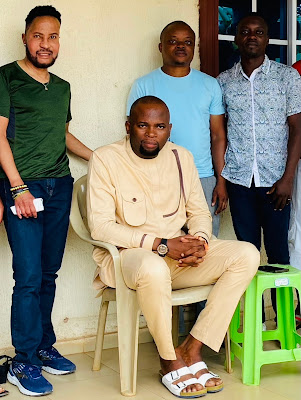Kwei--Wednesday
I'm in Nigeria to research my next novel, LAST SEEN IN LAPAZ, which is about sex and human trafficking (another one of my bright and cheery topics). It takes place in Nigeria, Niger, and Ghana, hence my travel to those three countries--ten days in Nigeria, eight in Niger, and four weeks in Ghana.
Happily or unhappily, depending which way you look at it, Ghana is Shangri-La compared to Nigeria, which is arguably now a failed state. It's quite difficult here, but I'll be gone in a few days while millions remain behind. The abject suffering is what lures Nigerians (primarily) men and women to make a break for Europe via Niger, the Sahara, and Libya. This a tragic trail of tears and blood.
There's an issue with Internet connection--I'm convinced the multinational phone companies in West Africa are price fixing, but that's another story, but the bottom line is I have a limited bandwidth available, so rather than my usual in-depth blogs, I'm just going to post some of my photos and at some point in the future I can perhaps add more detail.
 |
Don't ask what I was trying to prove here
|
At the moment I'm in Benin City, and as Stan is probably well aware, the Benin Empire is one of the oldest in West Africa with some treasured artwork, sculptures, brass and bronze works, and so on. By the way, Britain still has Benin treasures it looted long ago and refuses to give up, which I find quite disgusting.
 |
Metal works of one of the ancient Benin kings (oba)
|
 |
With my guides at the National Museum of Benin City
|
 |
One of the oldest shrines in Benin City
|
 |
Monument to a soldier
|
 |
Bronze work--sacrifice to the king (Shutterstock)
(in this case, photography in the museum was prohibited, so
I couldn't take the photo myself)
With a young chief (center) who is a direct descendant of the ancient kings
|
 |
| Brass pendant of a chief (this is not a cheap Chinese knock-off!) |
If you have any doubts about the authenticity of the pendant, we went to the furnace location where it was made. It's backbreaking work and NOT mechanized in any way.
 |
| One of the furnaces to the left |
The wood and charcoal furnaces used become red hot as the desired temperature for the brass or bronze work is reached. It's incredibly hot standing near the furnaces.
























Must be fascinating. I'm looking forward to the in depth updates later.
ReplyDeleteKwei, I am grateful to you for checking in, because you are in my thoughts. I am looking forward to your novel--and seeing you IRL again!
ReplyDeleteThanks Kwei. The Metropolitan Museum in New York just graciously decided to return 2 of its 160 looted Benin treasures to Nigeria - with associated hoopla, of course. Did you learn when the new museum is likely to be completed?
ReplyDeleteThe “what was yours is now ours” attitude disgusts me too Kwei. There was even a theory that a European must have traveled to the west African coast and taught the “savages” to make art. UGH!!
ReplyDeleteThen there was the German explorer Leo Frobenius who was likely the first European to come across the bronzes and terracottas of the Kingdom of Ife. Unwilling to believe that anyone in Africa could produces pieces of such beauty, he declared that he'd come across the lost site of Atlantis! In his book VOICE OF AFRICA, he wrote ""Before us stood a head of marvellous beauty, wonderfully cast in antique bronze, true to the life, incrusted with a patina of glorious dark green. This was, in very deed, the Olokun, Atlantic Africa's Poseidon." He followed that with this - referring to the inhabitants of Ife: "I was moved to silent melancholy at the thought that this assembly of degenerate and feeble-minded posterity should be the legitimate guardians of so much loveliness."
DeleteOh Stan! Did you have to say this when I had just finished eating lunch? Talk about disgusting!
DeleteI'm looking forward to your report on Nigeria, because I just had a very interesting conversation with a good friend in Greece whose family has been doing business in Nigeria for generations. He believes that by 2050 Nigeria will be one of the world's leading economies, what with it already being Africa's largest and the seemingly indefatigable diligence of its people.
ReplyDelete